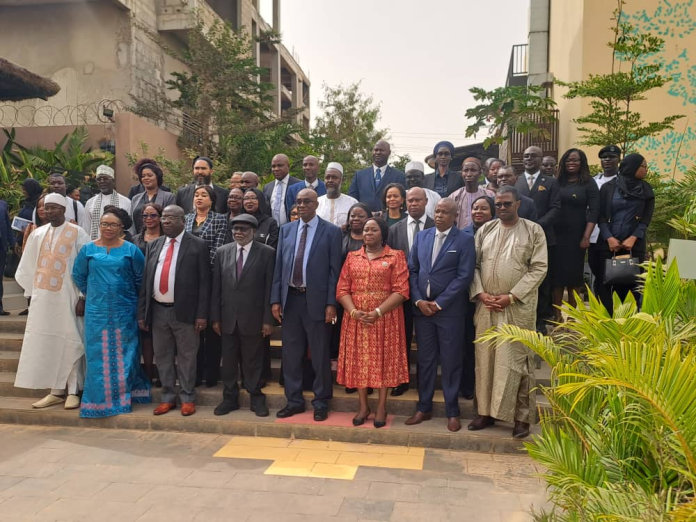By: Kebba AF Touray
The Gambia’s Chief Justice, Justice Hassan B. Jallow CRG, has said that access to speedy and quality justice is an important element of good governance.
Justice Jallow said this on Monday 29th April 2024, at the opening of a three-day meeting of the ECOWAS Judicial Council, currently underway in the Gambia.
He said: “Access to speedy and quality Justice by ECOWAS citizens is no doubt an important element of the good governance to which the organization is committed and which it is actively promoting in our region”.
Justice Jallow added: “It is thus imperative that we continue to strengthen the Judicial Council in its mandate and in that way improve the operational efficiency of the ECOWAS Community Court of Justice which is today one of the most vibrant organs of the community”.
Explaining the genesis of the meeting, he said that the genesis of the gathering of today lies in the meeting of the ECOWAS Judicial Council held in February 2024 in the city of Abuja Nigeria under the presidency of the distinguished Hon. Chief Justice of Nigeria and Chairman of the ECOWAS Judicial Council Justice Olukayode Ariwoola.
He said that It was observed on that occasion that the Rules of Procedure of the Judicial Council are inadequate and need to be reviewed and revised in line with promoting more effectively the mandate of the Council.
He explained: “We accordingly constituted a five-member Committee of the Council comprising Benin, The Gambia, Ghana, Guinea Bissau and Sierra Leone to convene in Banjul to consider and submit recommendations to the Council for the improvement of the rules of procedure of and the legal framework relating to the Council”.
Simultaneously, he said, the Council also decided at its Abuja meeting to constitute another committee comprising Cabo Verde, Liberia, Senegal, Sierra Leone and Togo to review the implementation or enforcement of the decisions of the ECOWAS Community Court of Justice as well as enhance its operational efficiency, and “That Committee, I am advised, has just recently concluded its work in Dakar, Senegal”.
He told the convergence that ECOWAS has today become a household name throughout the region and indeed well beyond. Conceived several decades ago by its Founding Fathers as an instrument for promoting economic integration in our region, and ultimately greater political cohesion and unity amongst its member states, the organization has matured and expanded its mandate beyond economic matters, he added.
“It has distinguished itself in its peace keeping operations and on its emphasis on good governance, democracy, respect for the rule of law and for human rights as the foundation of the ultimate goal of integration,” said Chief Justice Jallow.
He added “We in The Gambia, like other member states, are indeed truly cognizant of the value of the ECOWAS and will remain appreciative of its intervention to restore and consolidate good governance in our country. We shall continue to work for the strengthening of its institutions and procedures for the benefit of the citizens of the community”.
He acknowledged and indeed welcomed the support of the community in the establishment of appropriate mechanisms and procedures to secure accountability for serious crimes identified by The Gambia’s Truth Reconciliation and Reparations Commission and as accepted by The Gambia government in its White Paper.
He challenged “But we must continue to look forward. The Community Court of Justice has now evolved from being solely interstate Court adjudicating disputes between its member states. Its human rights jurisdiction has become a veritable avenue for aggrieved individuals within the ECOWAS region to seek and to obtain redress from injustice”.
In a similar vein, he stated that they should now be looking seriously at the possibility of the ECOWAS Court being not just a partner but an actor in holding to account persons who commit international crimes within its territory.
“In short we should consider vesting the ECOWAS Court with the jurisdiction to prosecute all persons who commit serious international crimes such as genocide, crimes against humanity, war crimes, crimes against the environment and national resources, drug trafficking, trafficking in persons, sexual and gender based crimes to name a few,” he emphasized.
Chief Justice Jallow went on to state that in a scenario of incapable or unwilling national systems on the one hand and on the other universal but distant and inaccessible international criminal courts, he believes that the cause of accountability for international crimes would best be served in the region by vesting such a mandate in a regional court such as theirs, which is already anchored on regional efforts to promote economic progress and good governance.
“We need to collectively take ownership of the process of accountability for serious crimes through our local/national and regional institutions. Where, as often happens, national institutions are unable to exercise jurisdiction for reasons of capacity or legal obstacles we should be able to fall back on a regional judicial institution such as the ECOWAS Court to which we all subscribe,” he urged.
He said that an ECOWAS system of Justice which adjudicates on interstate disputes, “Exercises jurisdiction over individual complaints by citizens of the abuse of their rights and enjoys a penal jurisdiction for the prosecution and holding to account of the perpetrators of serious crimes in our region will provide a more effective and comprehensive mechanism and foundation for good governance, respect for human rights and the rule of law within our region”.


















